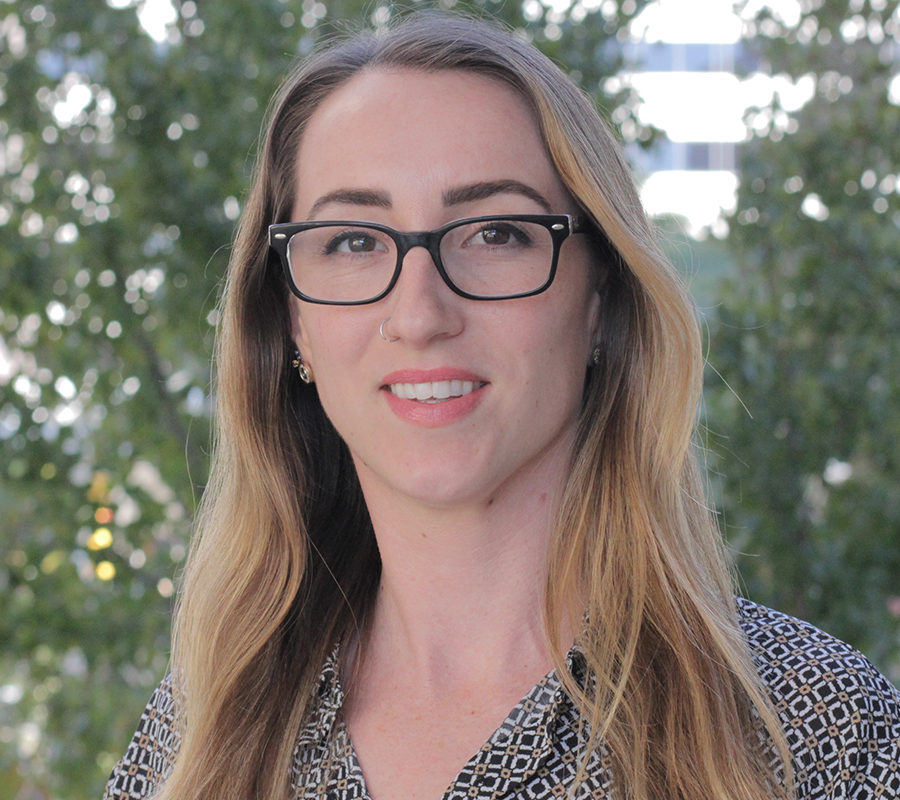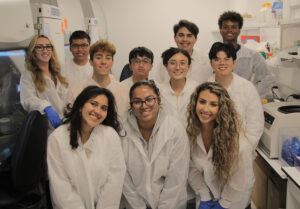
Louise Menendez, the newest assistant professor in USC’s Department of Stem Cell Biology and Regenerative Medicine, credits her mother as her first role model for career success.
Both of Menendez’s parents work in the computer software field, and immigrated from France to Petaluma, California during the 1980s tech boom. For her mother, this meant pursuing a career in a field that was largely male-dominated.
“My mom maintained her own work identity while raising a family,” said Menendez. “She had a really strong work ethic, and motivated me to always want to do a good job at what I was doing.”
Similar to her mother, Menendez’s passions and talents inspired her to pursue a career in a historically male-dominated arena.
“When Title IX passed into law in 1972 and outlawed sex discrimination in educational institutions receiving federal funding, it paved the way for more females in academia and female professors,” said Menendez. “And I know that it paved a way for more women in science, and more diversity in science as well. But overarchingly, in academics, it has been a male-dominated world, and even more specifically, white males.”
As an assistant professor at USC, Menendez is working to diversify both science and academia as the stem cell department’s only faculty member whose effort is 100 percent dedicated to teaching. In her new role, she is spearheading educational efforts related to developmental and stem cell biology for undergraduate and master’s students.
“I just love getting people excited about science and helping them find their passions,” she said.
From “Mini-farm” to a Seat at the Table
Menendez’s own introduction to biology was an inevitable result of growing up in Petaluma on her family’s “mini-farm,” which included cows, sheep, goats, chickens, and cats.
“Petaluma has changed a lot since I grew up there, but it was a smaller town with a more rural influence,” she said. “Growing up, I always enjoyed taking care of the animals and developed a fascination for all things biology.”
The first of three children, Menendez spoke only French at home, and learned English when she started to attend school.
As an undergraduate, she decided to stay close to home and attend the University of California, Santa Cruz. Originally enrolled as a pre-med student, she took a neuroscience class that convinced her to major in the subject, and eventually started volunteering in a fruit fly lab that was studying genetic mutations linked to Parkinson’s disease, which causes muscle tremors and other symptoms of neurodegeneration.
“I got really excited about research and realized that it was just as important as the doctors practicing medicine,” she said. “These researchers are understanding diseases, so we can make better therapies.”
After completing her bachelor’s degree in neuroscience in three years, she spent a fourth year continuing to volunteer in the lab while applying to PhD programs.
She was accepted into USC’s PhD program in Neuroscience. For her first two lab rotations, she used fruit flies to study neuroscience and neurodegenerative disease—work similar to her undergraduate lab experience. Then something unexpected captivated her: working with human cells during her third and final rotation in the USC Stem Cell lab of Justin Ichida, which studies the fatal neurodegenerative disease ALS.
“It was completely new,” said Menendez. “I had never cultured cells before. It was very overwhelming. But at the same time, I got to do some cellular reprogramming and basically make neurons in a dish, and I was immediately fascinated.”
Several PhD students had already joined the Ichida Lab during the previous year, so Menendez needed to obtain her own funding to open up an additional spot for a graduate student. Undeterred, she secured a National Institutes for Health (NIH) training grant in hearing and communication neuroscience, which positioned her to work on a project that brought together the Ichida Lab with the USC Stem Cell lab of Neil Segil, which studies hearing loss.
“I’m just so thankful, because I got to work under two professors and get a double dose of mentoring—also a double dose of experiments sometimes,” she said. “It really was a unique experience.”
The project relied on expertise from the Segil Lab and techniques pioneered in the Ichida Lab to “directly reprogram” a variety of different types of mouse cells to become the sensory cells of the inner ear, which enable hearing. Menendez and her colleagues published their results in the journal eLife in 2020. Menendez also graduated with her PhD the same year, and stayed on briefly as postdoctoral scholar to train new members of the Segil Lab to continue the successful project.
By this time, Menendez already knew that teaching was her calling, after having served as a teaching assistant in a lab course for master’s students in stem cell biology and regenerative medicine, and also giving lectures for graduate students about hearing and communications neuroscience while completing her own PhD.
In January 2021, she started a position as an adjunct professor at Mission College, which is part of the Los Angeles Community College District. Due to the COVID-19 pandemic, she conducted her first semester via Zoom, teaching general biology for non-science majors.
“A good learning experience for me was to try and get these students, who don’t necessarily have a passion for science, at least excited enough to learn the content and pass the class,” she said. “Doing that all virtually was really tough.”
In Fall 2021, she accepted an additional adjunct faculty position at Long Beach City College, teaching biology for science majors. Although the lectures were still online, students were able to return to campus for the course’s lab component—making for a much more productive and enjoyable experience.
It was at the funeral of her PhD co-mentor Neil Segil, who had given Menendez her first opportunities to teach before he passed away from pancreatic cancer in 2022, that Menendez learned that USC’s Department of Stem Cell Biology and Regenerative Medicine would be hiring a full-time teaching faculty member.
“I was really excited about this position, because it is 100 percent teaching,” she said, “but I knew that being back at USC would also put me close to the research. It’s a unique position. And the department really wanted to expand what USC Stem Cell has to offer in educational programs.”
Menendez got the job, and started as an assistant professor of stem cell biology and regenerative medicine in September 2022.

Since starting her position, the department has introduced a new minor in stem cell biology and regenerative medicine, as well as a training program for undergraduates from historically underrepresented backgrounds with an interest in studying stem cell biology and regenerative medicine. Known as USC COMPASS: Creating Opportunities through Mentorship and Partnership Across Stem Cell Science, the program launched in Summer 2023 with support from a $2.9 million grant from the California Institute for Regenerative Medicine (CIRM), the voter-created state agency charged with distributing public funding to support stem cell research and education.
“Interacting with research earlier on can set these students up to do more impactful research down the line,” she said. “Maybe they’ll go to graduate school and do a PhD, and they’re just better prepared for that process. But also, just thinking like a scientist can be really beneficial for a lot of careers: problem solving, strategizing, troubleshooting, and asking questions. So I’m really excited to hopefully help some students find their passions and make it easier for them to take those next steps.”
She added, “I’ve always wanted to inspire this next generation of students.”
